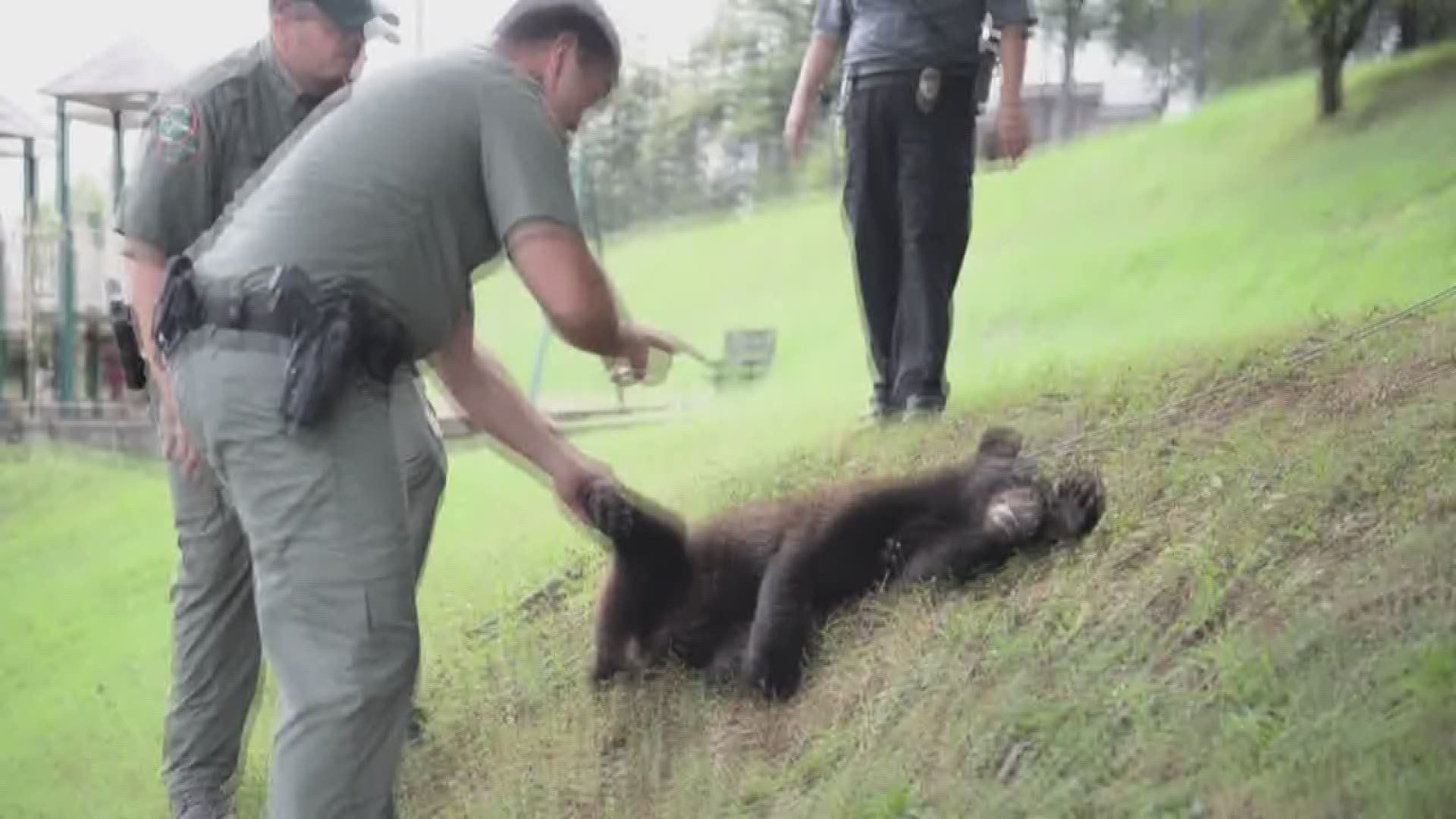Black bears: They like to wander and are very good at climbing trees.
Sometimes, though, they wander to places that are a little too close to the public for their safety. In one yearling's case, it was wandering around East Knoxville Tuesday taking in all the sights.
The Tennessee Wildlife Resources Agency received calls about a black bear around the area and mobilized. They eventually tracked it high atop a tree in Morningside Park.
The TWRA and animal patrol officers with the Knoxville Police Department arrived, but weren't quite sure how to deal with it because they needed to relocate the yearling -- but didn't want to hurt it. They couldn't just leave it alone, though, as they didn't want it wandering into nearby downtown Knoxville.
Matt Cameron with the TWRA said officers kept an eye on it for an hour hoping it would come down from the tree on its own. It eventually did come down a little lower -- about 15 feet off the ground.
Officers decided it was safe enough to tranquilize the bear. Cameron said they only fire tranquilizers when there is a clear shot because they want to be sure it will hit.
Officers took the shot and hit it, and said the bear slowly went to sleep on the branch it was on.
Officers then got a step ladder and used catch poles to get it down from the branch.
The unconscious yearling was dragged down the hill, loaded up and taken to the Cherokee National Forest to be relocated. Officers said they were glad to get the bear down without harming it.
"A lot of times when they get in an urban area like this, we're not sure what to do because they keep moving," Cameron said.
He said the yearling likely wandered into Knoxville in search of its own territory and an easy meal. In the early summer months, natural food isn't as readily available for bears and they search for anything can scrounge up, which often leads them to readily available meals in trash cans, pet bowls and the like.
Knoxville might not be considered bear country, but Cameron said there's a trend happening that may change that perception in the future.
So far, Cameron said they have responded to three or four bear calls in Knoxville since spring started. He believes this is sign bears are continuing to migrate further into the valley and establish their homes in places outside the Smokies.
"Expect to see even more black bears over the next couple of decades," he said.
Cameron said the Great Smoky Mountains and Cherokee National Forest can only sustain so many bears, so the ones like this yearling who aren't able to compete or thrive come down looking for territory to expand to.
While bears are fascinating, Cameron stressed the importance of people doing their due diligence to maintain their distance between these important wild creatures.
TWRA recommendations:
-Never feed or approach bears-- this includes carefully managing sources of human food or garbage to make sure the bears can't access it or aren't attracted to the area. When camping in bear country, keep all food stored in a vehicle and away from tents.
-If you live in a town near black bear habitats, you should not store food, garbage or other recyclables in areas accessible to bears. You also should avoid feeding birds or other wildlife where bears are active.
-Outdoor pets should only be fed a portion they will completely consume, and keeping grills and smokers cleaned and stored securely will also help deter bears.
-If you do encounter a bear, remove whatever attracted the bear to come into your area. There is almost always a safe escape route when bears enter towns. Crowd control is the initial concern as the behavior of a cornered bear can be unpredictable. Immediately report to the TWRA or local police any sightings of bears within areas of human population centers.
-While black bears are usually tolerant of humans, they should always be treated as wild animals, whether in residential or backcountry areas. Black bears are rarely aggressive towards people and typically go out of their way to avoid contact, however as human development continues and bear numbers increase, occasional interactions will be unavoidable.
-If you see a black bear from a distance, alter your route of travel, return the way you came, or wait until it leaves the area. Make your presence known by yelling and shouting at the bear in an attempt to scare it away.
-If approached by a bear, stand your ground, raise your arms to appear larger, yell and throw rocks or sticks until it leaves the area. Never run from a black bear! This will often trigger its natural instinct to chase.
For more information on how to peacefully co-exist with black bears, visit www.tn.gov.

